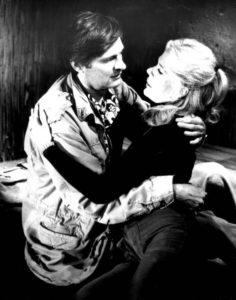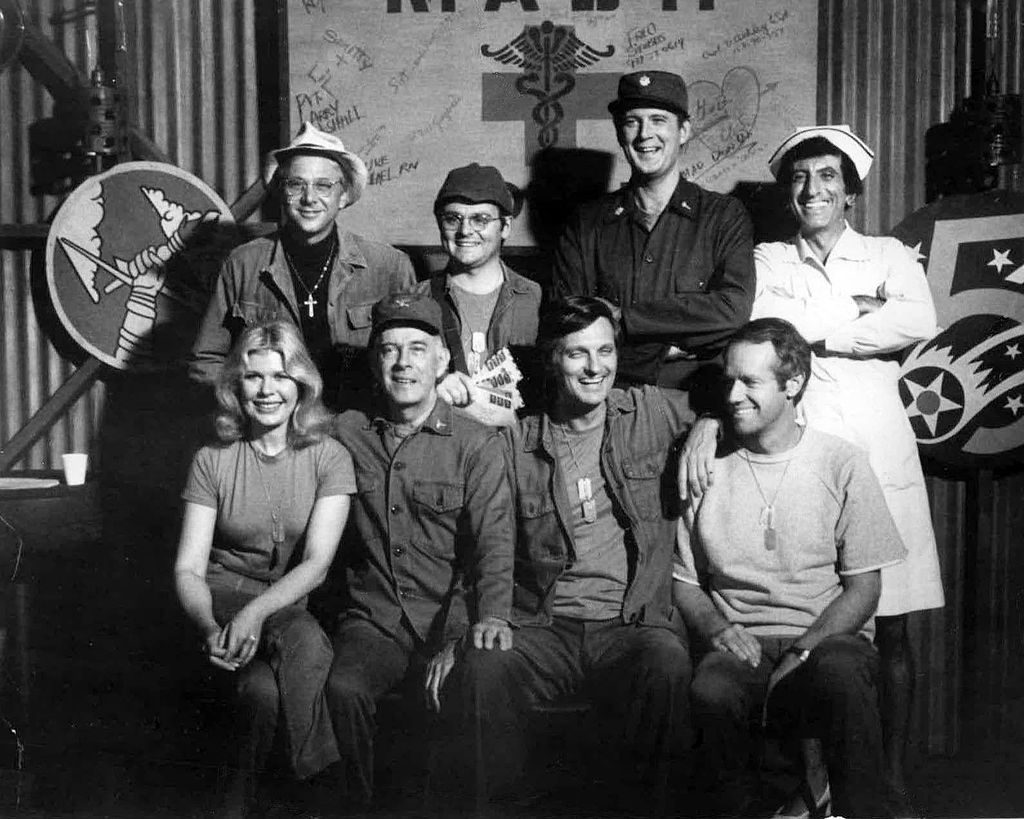This fall, LIFE magazine has published a special issue commemorating the 50th anniversary of the movie M*A*S*H. Despite the hook, the issue focuses on the ensuing TV series, which ran from 1972 to 1983. Though the show has often been characterized as being politically left-wing, it actually is heavily classically liberal, celebrating the individual, civil liberties, and the market, and harshly criticizing anti-individualism, government compulsion, and government decision-making. In a series of essays, I examine the classical liberalism of M*A*S*H. This is the 6th and final part. Part 1 is here. Part 2 is here. Part 3 is here. Part 4 is here. Part 5 is here.
M*A*S*H’s respect for civil liberties goes beyond people’s right to property and exchange. Freedom of speech and the press are lionized for protecting against government abuse (“For the Good of the Outfit,” “Are You Now, Margaret,” “Tell It to the Marines” [s. 9]); censorship is condemned and lampooned (“For the Good of the Outfit,” “The Moon Is Not Blue” [s. 11]); and religious freedom is revered (“Ping Pong” [s. 5], “A Holy Mess” [s. 10]).
Throughout the show’s run, bigotry is condemned. Racism is ridiculed (“L.I.P.” [s. 2],” “The General Flipped at Dawn,” “Yessir, That’s Our Baby,” “Bottle Fatigue” [s. 8], “The Tooth Shall Set You Free” [ s. 10]) and immigration is championed (“L.I.P.,” “Tell It to the Marines”). In “Dear Dad … Three” (s. 2), a wounded white soldier, Sgt. Condon (Mills Watson), warns the doctors to make sure he gets the “right color” blood. Hawkeye and Trapper decide to teach him a lesson, sneaking into the recovery room at night to dab the sleeping soldier’s skin with tincture of iodine. Worried that his darkening complexion indicates he has indeed been given the wrong blood, Condon confronts the doctors:
CONDON
What are you guys tryin’ to do to me? Did you give me the wrong color blood?
TRAPPER
All blood is the same.
HAWKEYE
You ever hear of Dr. Charles Drew?
CONDON
Who’s that?
HAWKEYE
Dr. Drew invented the process of separating blood so it can be stored.
TRAPPER
Plasma.
HAWKEYE
He died last April in a car accident.
TRAPPER
He bled to death. The hospital wouldn’t let him in.
HAWKEYE
It was for whites only.
TRAPPER
See ya, fella.
At the end of the episode, a wiser Condon thanks the surgeons “for giving me a lot to think about” and respectfully salutes nurse Ginger Bayliss (Odessa Cleveland), an African-American.

Sexism and sexual harassment are likewise treated with derision (“What’s Up, Doc?” “Hot Lips Is Back in Town” [s. 7], “Nurse Doctor” [s. 8]). In “Inga” (s. 7), Hawkeye —a notorious womanizer in the series’ early seasons — is agog over a visiting woman surgeon (Mariette Hartley) — until she shows him up in the operating room. Later, Margaret takes him to task for having a limited view of women:
MARGARET
You think a woman is dead until she lives for you. Well, let me tell you something, Benjamin Franklin: We actually survive without you.
We live, we breathe, we dream, we do our work, we earn our pay. Sometimes we even have our little failures, and then we pull ourselves together, all without benefit of your fabulous electric lips!
And let me tell you something else, buster! I can walk into that kitchen any time I want and replace those fabulous lips of yours with a soggy piece of liver!
M*A*S*H also respects the rights of homosexuals (“George,” s. 2) and the disabled (“Dear Uncle Abdul” [s. 8], “Run for the Money” [s. 11]). In “Morale Victory” (s. 8), Charles — a lover of chamber music — tries to help an injured soldier, David Sheridan (James Stephens), accept a permanent loss of dexterity in one hand even though Sheridan is a concert pianist. Charles introduces him to compositions written for one hand, explaining that the injury does not diminish who he is or his talent (and illustrates comparative advantage):
CHARLES
Your hand may be stilled, but your gift cannot be silenced if you refuse to let it be.
SHERIDAN
Gift? You keep talking about this damn gift.
I had a gift, and I exchanged it for some mortar fragments, remember?
CHARLES
Wrong. Because the gift does not lie in your hands.
I have hands, David. Hands that can make a scalpel sing.
More than anything in my life, I wanted to play, but I do not have the gift.
I can play the notes, but I cannot make the music.
You’ve performed Liszt, Rachmaninoff, Chopin.
Even if you never do so again, you’ve already known a joy that I will never know as long as I live.
Because the true gift is in your head, and in your heart, and in your soul.
Now, you can shut it off forever, or you can find new ways to share your gift with the world — through the baton, the classroom, the pen.
As to these works, they’re for you, because you and the piano will always be as one.
Classical liberals respect civil liberties because they appreciate the value — and even marvel at the wonder — of the individual. (In contrast, the non–classical liberal Frank Burns believes that “individuality’s fine, as long as we all do it together” [“George”].) This wonder is expressed in “Hawkeye” (s. 4), in which Hawkeye suffers a concussion while away from the unit and seeks help from a Korean family. Despite the language barrier, he keeps talking to stay awake, often falling into philosophizing:
HAWKEYE
Don’t you sometimes wonder about babies? I mean, how do they know what to do in there? They start out looking like little hairless mice, and they wind up looking like us.
How’s it all work?
I’ve held a beating heart in my hand. I’ve poked into kidneys and crocheted them together again. I’ve pushed air into collapsed lungs like beat-up old pump organs. I’ve squeezed and probed and prodded my way through hundreds of miles of gut and goo, and I don’t know what makes us live.
I mean, what keeps us in motion? What keeps the heart beating without anybody rewinding it? Why do the cells reproduce and re-re-reproduce with such gay abandon?
Did you ever see Ann Corio or Margie Hart? Strippers. … I remember Polly O’Day. She worked with a parrot. He didn’t help her strip or anything; while she got undressed, he stood on the side and talked dirty. It was an exciting act. What a body. She was built great, too.
But what I don’t understand is how she got that way, any more than how we did.
Look at your hand. It’s one of the most incredible instruments in the universe. Of all the bones in the body, one fourth are in the hand.
Forget the hand; look at your thumb, that wondrous mechanism that separates us from the other animals. The world-famous opposable thumb, that amazing device that has transported more students to college than the Boston Post Road. Ideal for sucking, especially as a baby. And lauded in song and story as the perfect instrument for pulling out a plum. Or, in the case of the Caesars, for holding it down for the gladiator to die, or holding it up, which means, “See you later at the orgy.”
My friends, for getting up and down the pike, in your pie, in your eye, I give you the thumb.
Have you any idea, Farmer Brown, of the incredible complexity of this piece of human apparatus?
You have no idea of the balletic interplay of parts that make up the human thumb. The flexor ossis metacarpi pollicis flexes the metacarpal bone. That is, draws it inward over the palm, thus producing the movement of opposition — and the Boy Scout salute.
Because of this magical engineering, we can do this. [Grasping a utensil.] And this. [Grasping a cup.] And this. [Making a fist.]
But our greatest triumph comes not from flexing the metacarpal bone and making a fist, which always seems to be thirsting to be clenched. No, no, no, no, no.
Our greatest moment is when we open our hand: cradling a glass of wine, cupping a loved one’s chin. And the best, the most expert of all, keeping all the objects of our life in the air at the same time. [Picking up three pieces of fruit.]
My friends, for your amusement and bemusement, I give you the human person. [Begins juggling the fruit.] Thumb and fingers flexing madly, straining to keep aloft the leaden realities of life: ignorance, death, and madness. Thus, we create for ourselves the illusion that we have power, that we are in control, that we are loved.
Weary Determination
Sadly, M*A*S*H seems out of step with today’s politics. In the America of the 1970s and ’80s and on through the end of the century, both the Democratic and Republican parties were liberal in the classical sense, believing in the value of the individual, the importance of civil liberties, and the benefits of the market. The parties did differ — vigorously — on where to draw certain lines: how big should the welfare state be and what should be required of beneficiaries, how muscular should foreign policy be, what tax rates should be. But those differences fit within a classical liberal philosophy. It’s no wonder that M*A*S*H found plenty of fans on both sides of that era’s red–blue divide.
Today, the show might not find a similar audience. Both ends of the American political spectrum have embraced illiberalism, demanding that speech and the press be constrained, denigrating religious differences, reanimating old bigotries, obstructing immigration, and clamping down on markets and private exchange.

For classical liberals, today’s politics are disturbing and exhausting. We feel a bit like the members of the 4077, who were tired of war, troubled by the horrors they witnessed, and desired the peaceful lives they led before Korea. But they rallied when they needed to. When the choppers and ambulances arrived laden with casualties, the 4077 determinedly carried out their medical duties. And when morale sagged, they found ways to boost it, often with a gag at the expense of some hypocrite, fool, or sadist who sorely deserved it.
And so, maybe classical liberals in the 21st century can rally in the face of today’s grim times — and at the expense of illiberals who deserve it. And, concerning this so-far-illiberal century, maybe we can be reassured by Colonel Potter’s words to an orphan boy in “Old Soldiers”: “You’re off to a kind of a rough start, but I bet you’ve got some glorious times ahead of you.”
Editor’s Note: Firey’s entire piece is also available here.


READER COMMENTS
John Hall
Nov 20 2020 at 10:41am
I checked wikipedia on Dr. Charles Drew and apparently what MASH said was a common misconception. He was treated, but his injuries were grave enough to kill him anyway.
CD
Nov 22 2020 at 4:01am
I am surprised about the lack of commentary in the articles on the relentless sexism in the show (unless I missed it), especially in the early seasons. Hawkeye, despite his charm and progressive views is an an unrepentant, lecherous predator who expects every nurse to jump into bed with him. It is implied in several episodes that Margaret Houlihan carried on affairs with senior officers to get ahead, at least until later in the series when she became a less cartoonish and more developed character. With the exception of MAJ Houlihan, the nurses are mostly anonymous secondary characters. I was re-watching the entire series recently on MeTV and it does not hold up well in the “Me Too” era.
Amy Willis
Dec 8 2020 at 5:23pm
From Mike Farrell (a.k.a. BJ Hunnicut):
Comments are closed.